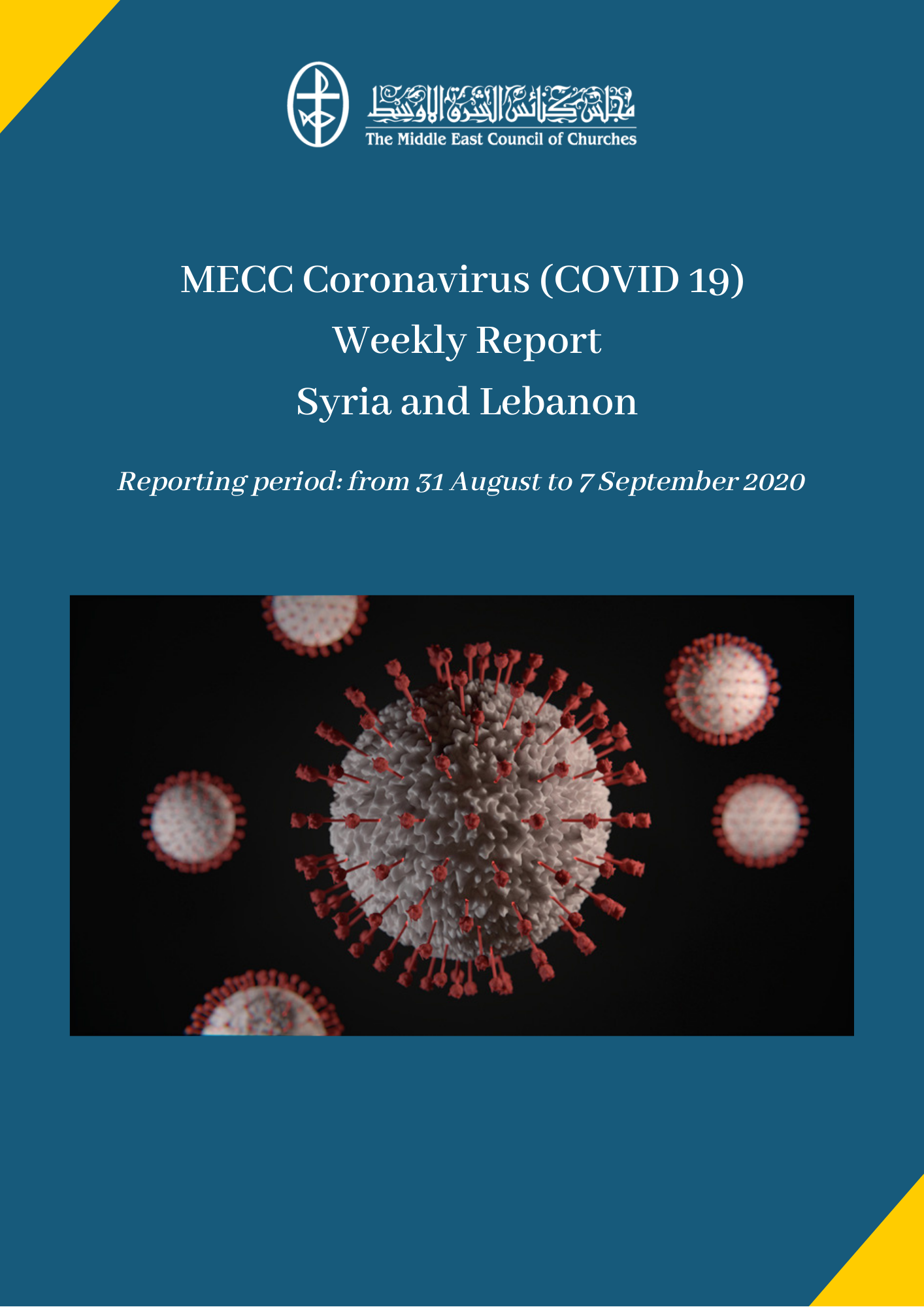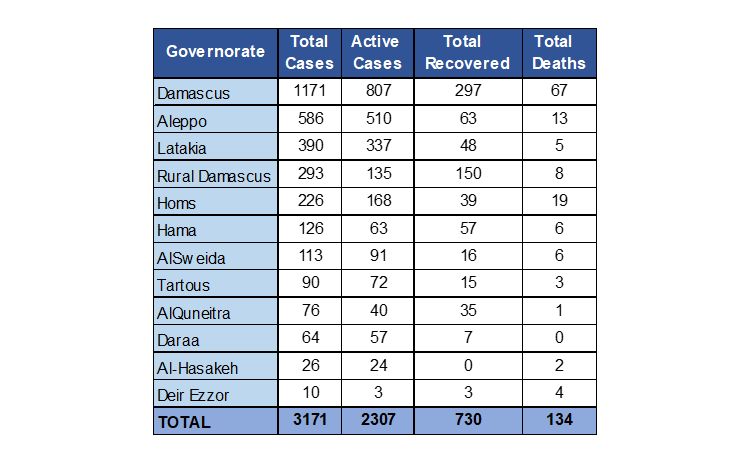MECC Coronavirus (COVID 19) Weekly Report
SYRIA: COVID-19
Humanitarian Update No. 24
Reporting period: from 31 August to 6 September 2020
Coronavirus cases: 3,171 Active cases: 2307 Recovered: 730 Deaths: 134[1]
As of 6 September, Number of people confirmed by the Ministry of Health (MoH) to have COVID-19: 3171 (134 fatalities, 730 recovered).
As of 24 August, The MoH has reported approximately 26,572 tests have been performed in laboratories in Damascus, Aleppo, Homs and Lattakia governorates.
Of the cases, 105 cases were announced as imported and 203 as a secondary case (exposure/contact with a known case).
According to the MoH,90 health care workers have tested positive for COVID-19, This includes 51 in Damascus, 14in Rural Damascus, six in Aleppo, five in Quneitra, four in Lattakia, three in Tartous, two each in Hama and As-Sweida, and one each in Homs, Hama and Al-Hasakeh.
Humanitarian actors have received ongoing and increased numbers of unverified reports concerning additional possible cases including a rise in obituaries, death notices and burials.
Increased reporting across a range of media outlets on COVID-19 has also continued in Syria, notably on Facebook, where health care professionals have indicated that the actual COVID-19 caseload in Damascus alone is far higher than official records.
Of note, among official cases confirmed by the MoH the source of approximately 89 percent of cases to date remains unknown. These factors indicate that community transmission across Syria is now widespread.
Authorities in Northeast Syria(NES) have announced 557 positive cases (460 in Al-Hasakeh, 62in Aleppo, 32in Ar-Raqqa, and 21 in Deir-ez-Zor). Of these, 34 fatalities have been reported, with 88recoveries. Healthcare workers have also been affected, with 92reported cases.
To date, approximately 3,874 nationals have been repatriated from abroad on flights to Damascus and Lattakia airports.
Preventive measures
The GoS (government of Syria) continues to maintain a widespread easing of preventive measures introduced throughout May, albeit with some ongoing changes, including recent ad-hoc suspension of prayers in some locations, and closures of wedding halls.
In NES, on 28 August, citing the economic and social reasons, local authorities largely lifted general preventive measures imposed on 23 July, allowing shops/services and local authority departments to reopen, and movement between towns, cities and districts. However, social gatherings including weddings and funerals are still banned, and places of worship and public places remain closed.
In NES, on 29 August, local authorities issued a directive announcing that the 2020-2021 school year would be postponed until4 October 2020 as a COVID-19 preventive measure.
Preparedness and response
During the reporting period, supplementary 12th grade exams were completed, as were 9th grade exam.Humanitarian partners provided multi-sectoral support including infection prevention and control (IPC) measures, as well as the provision of meals, NFIs and dignity kits to those hosted in accommodation centers.
WHO-supported mobile teams, in cooperation with UNICEF, conducted awareness-raising campaigns in Hama, Homs and Lattakia, in addition to psycho-social support (PSS) to 30,000 people in need. Door-to-door visits were also conducted to combat stigma and deliver mental health/PSS services. WHO has further implemented a session on COVID-19 awareness in all trainings to engage healthcare workers in the interventions.
In the reporting period, UNICEF conducted a first round of Risk Communication and Community Engagement (RCCE) workshops in reaching 280 trainees across all governorates, covering key concepts of risk communication and community engagement.
UNHCR supported seven trainings for community volunteers, including on COVID-19 awareness. UNICEF conducted a first round of Risk Communication and Community Engagement (RCCE) workshops in reaching 280 trainees across all governorates, covering key concepts of risk communication and community engagement.
In Al-Hasakeh, Action Against Hunger (AAH) conduced awareness sessions on Infant and young child feeding (IYCF) best practices in the context of COVID-19. The Syrian Society for Social Development (SSSD) continued online awareness sessions and campaigns, targeting more than 10,000 people in Hama, Homs and Tartous governorates.
During the reporting period, more than 3,249 suspected COVID-19 cases and contacts were investigated within 24 hours of an alert being received.
To date, WHO has provided enzyme kits(31,240 reactions), extraction kits (47,250 reactions), screening kits(62,992 reactions)and confirmatory testing kits(1,920 tests), 52,000 swabs and viral transport medium for sample collection, five polymerase chain reaction (PCR)machines and two extraction machines, in addition to5,000 waste bags and 21,000 bags for samples, and PPE for staff. WHO has further supplies and equipment in the pipeline, including four GeneXpert machines. In addition, UNHCR has procure done GeneXpert machine.
To date, WHO has delivered more than 4.4 million Personal Protective Equipment (PPE) items, including 1.5 million medical masks, 67,848 N95/FFP2 respirator masks, 1.3 million gloves, 7,500 reusable heavy-duty aprons, 83,869 gowns, 662,600 head covers, 464,800 shoe covers 4,769 goggles and 18,406 coveralls, 3,500 face shields 308,407 alcohol hand-rubs and 75 PPE kits. In addition, over a million PPEs have been delivered by health sector partners.
In the reporting period, UNICEF provided 91,000 Personal Protective Equipment (PPE) to four hospitals in Damascus and Rural Damascus, and to 205 NGO health workers in Aleppo.
During the reporting period, Triangle Génération Humanitaire (TGH) continued daily water trucking to 260,100 individuals in Eastern Ghouta. UNICEF and WASH partners including SARC also continued to support emergency water trucking, including to Al-Hasakeh city and neighbouring communities (including Al Hol camp). Partners delivered 2,500 m3 per day for an estimated 250,000 people. UNICEF further supported a water treatment plant at Al-Hol producing 10m3 per hour.
UN Habitat continues to implement a solid waste management projects in Homs and Hama, including delivery of 50 solid waste containers, 3,000 liters of sodium hypochlorite, and spraying machines.
WHO supported eight university hospitals in Damascus with a two-day training on epidemiological analysis, infection prevention and control (IPC) / personal protective equipment(PPE), case definition and referral pathways, for 330 trainees. WHO further supported six two-day trainings for 180 workers at isolation hospitals and quarantine centers on case management and IPC/waste management measures, in addition to 173 health care workers from 93 primary health care centers in Damascus, Rural Damascus, Lattakia and Deir-Ez-Zor. UNICEF supported two trainings on IPC and rational use of PPEs for 107 health workers in Damascus and Aleppo. Finally, International Medical Corps (IMC) with SARC conducted COVID-19 awareness sessions in Deir-Ez-Zor, covering preventive measures, symptoms and measures to deal with suspected cases.
In the reporting period, WHO supported specialist training for 300 health care workers on case management in Homs, Lattakia, As-Sweida, Dar’a, Deir-Ez-Zor and Damascus, including a specialized training course on immediate life support and ventilator management. In addition, WHO further supported training, including on case management for 180 healthcare workers at isolation hospitals and quarantine centers, in addition to 173 healthcare workers from 93 primary health care centers in four governorates. Action Against Hunger (AAH) also provided specialist training for healthcare workers in Al-Hasakeh and Dar’a.
In NES, During the reporting period, a57-bed isolation centre at Washokani informal settlement came online; plans are underway to double capacity for suspected cases requiring enhanced individual isolation.[2]
Lebanon: COVID-19
Humanitarian Update No. 21
Reporting period: from 1 to 7 September 2020
Coronavirus cases: 20,426 Deaths: 191 Recovered: 6,139
Highlights
During this reporting period, the rate of new corona cases per day gradually decreased to 521 per day.
Despite the decrease, such a rate remains high, as Lebanon scores more than 20,000 overall cases.
COVID-19 continues to spread as many lockdown measures have been lifted.
Risks
Failure of those in contact with confirmed cases to adhere to home isolation procedures until the results of the laboratory tests are issued.
Gatherings for social events.
Failure to comply with the preventive measures and procedures required in a number of stores and markets (putting on a muzzle or face mask, sterilizing hands, maintaining a safe distance).
Some nightclubs that violated the General Mobilization Resolution No. 1032/2020, and failed to comply with preventive measures, and the permitted number of customers.
Preparedness and response
The Ministry of Public Health continued to receive medical donations from Egypt.
The Ministry of Health signed an agreement with the World Health Organization and Saint Joseph University to use academic expertise to develop the Lebanese Health sector.
The Ministry of Public Health released a statement claiming the Jordanian and Italian field hospitals dispatched after the Beirut explosion, can issue PCR tests.
In an attempt to prepare the Lebanese Health sector to risks such as corona, The Ministry of Health Dr. Hamad Hasan, facilitated coordination with banks to finance the sector.
The Ministry of Public Health launched talks with the Beirut Arab University about the possibility of accrediting its laboratory to conduct tests on medicines in accordance with scientific and medical standards.
[1] Worldometers, 30 August
[2] SYRIA: COVID-19Humanitarian Update No. 17, As of 1 September2020


